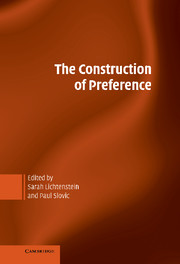Book contents
- Frontmatter
- Contents
- Contributors
- Preface
- Acknowledgments
- I INTRODUCTION
- II PREFERENCE REVERSALS
- III PSYCHOLOGICAL THEORIES OF PREFERENCE REVERSALS
- IV EVIDENCE FOR PREFERENCE CONSTRUCTION
- V THEORIES OF PREFERENCE CONSTRUCTION
- VI AFFECT AND REASON
- VII MISWANTING
- VIII CONTINGENT VALUATION
- 31 Economic Preferences or Attitude Expressions? An Analysis of Dollar Responses to Public Issues
- 32 Music, Pandas, and Muggers: On the Affective Psychology of Value
- 33 Valuing Environmental Resources: A Constructive Approach
- IX PREFERENCE MANAGEMENT
- References
- Index
32 - Music, Pandas, and Muggers: On the Affective Psychology of Value
Published online by Cambridge University Press: 05 June 2012
- Frontmatter
- Contents
- Contributors
- Preface
- Acknowledgments
- I INTRODUCTION
- II PREFERENCE REVERSALS
- III PSYCHOLOGICAL THEORIES OF PREFERENCE REVERSALS
- IV EVIDENCE FOR PREFERENCE CONSTRUCTION
- V THEORIES OF PREFERENCE CONSTRUCTION
- VI AFFECT AND REASON
- VII MISWANTING
- VIII CONTINGENT VALUATION
- 31 Economic Preferences or Attitude Expressions? An Analysis of Dollar Responses to Public Issues
- 32 Music, Pandas, and Muggers: On the Affective Psychology of Value
- 33 Valuing Environmental Resources: A Constructive Approach
- IX PREFERENCE MANAGEMENT
- References
- Index
Summary
How long would someone who is willing to work 3 hr for $30 be willing to work for $60? How much would someone who is willing to donate $10 to save one endangered animal be willing to donate to save four endangered animals? Such questions concern the relationship between the quantitative aspect or “scope” of a stimulus (e.g., the amount of financial reward, the number of endangered creatures) and a person's subjective value of that stimulus.
To elucidate the notion of subjective value, note that to gauge how much longer someone would work for $60 rather than $30, one must assess how much satisfaction or value the person accrues from either amount. If the satisfaction accrued from $60 is not much larger than that from $30, the individual will not work appreciably longer for the larger amount. Among other considerations, making a charitable donation presumably gives one moral satisfaction (e.g., Kahneman & Knetsch, 1992). Thus, to estimate how much more someone would donate to save four endangered animals rather than one, one must assess the extent to which an increase in the number of animals saved increases the amount of moral satisfaction.
As our disparate examples suggest, the notion of subjective value is very general and may be applied to just about any stimulus. The notion of scope is very general as well: Any quantitative aspect of a stimulus may form a scope variable. Perhaps not surprisingly then, the relationship between scope and value is of long-standing theoretical interest.
- Type
- Chapter
- Information
- The Construction of Preference , pp. 594 - 608Publisher: Cambridge University PressPrint publication year: 2006
- 2
- Cited by



